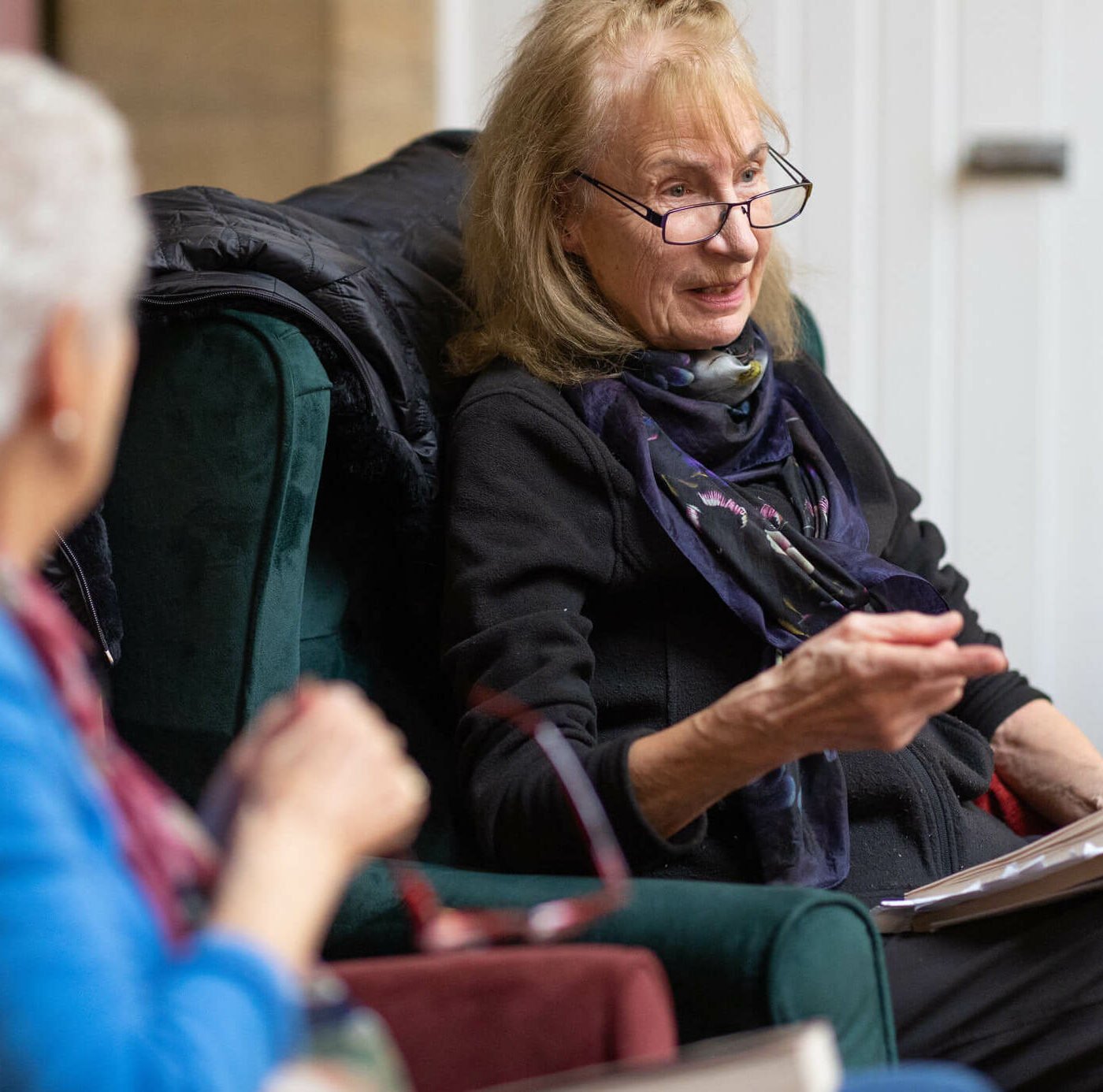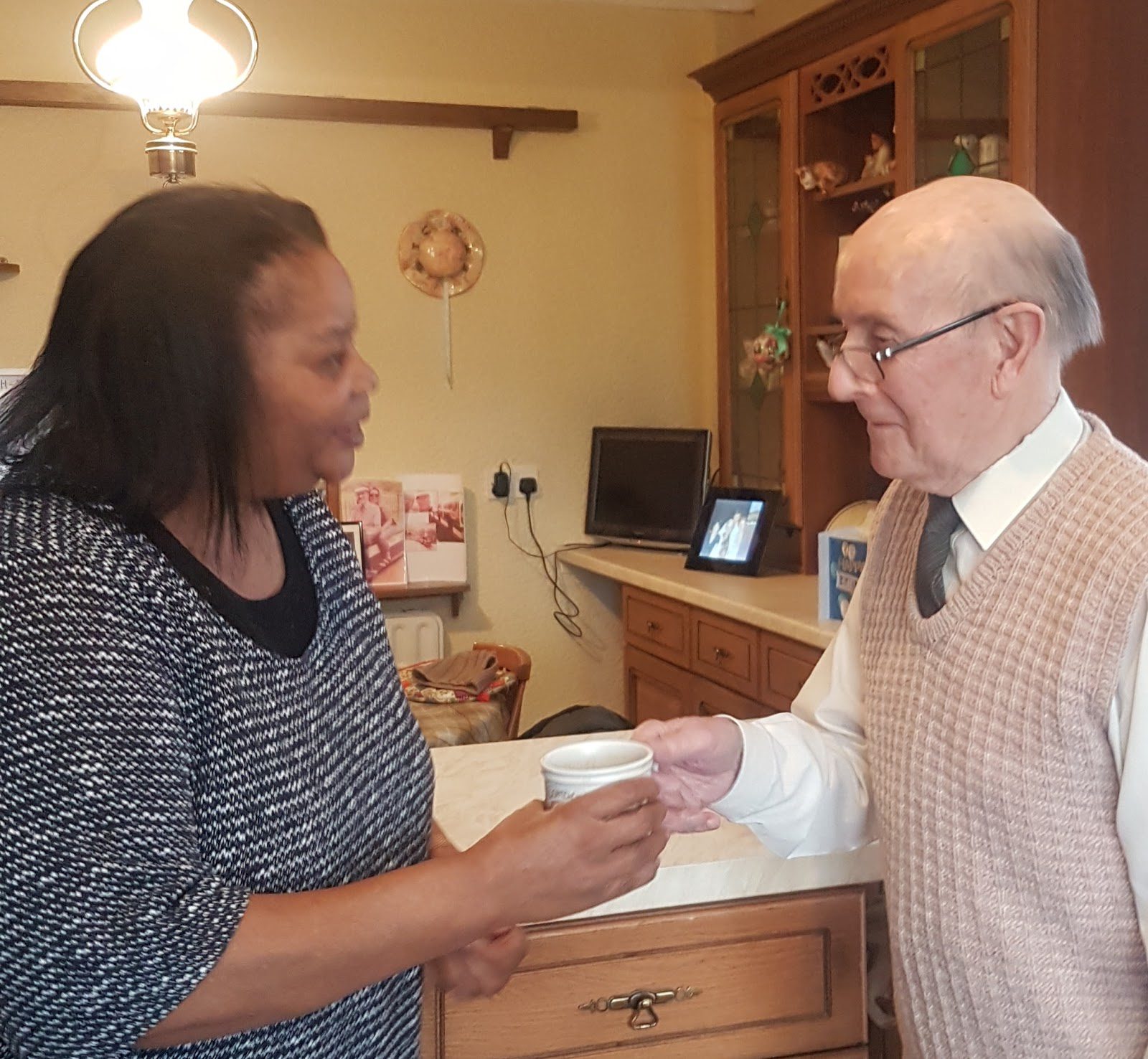What if my elderly parents or relatives refuse care?
Tags
Elderly Care
We all want the best for the people we love, which can make it all the more difficult when an older person refuses care and support. Whether you’ve noticed they’re starting to struggle with daily tasks like cooking meals or washing their hair, or if they’ve been in hospital and need support in place before they can go home, coming together and agreeing on the best way forward can take a lot of effort and understanding.
We’ve looked at some common situations as to why a person may be reluctant to accept care and looked at how you can work together to find the best option for your loved one, and the wider family.
Why might an older person refuse care?
Loss of independence
Think about it – most elderly people have lived independently for decades. Many would have left home, got married, had children, bought their first home, or joined the armed forces all before the age of 25. They would have spent years building a way of life and routine around the people and things they love most. Therefore, accepting help with daily tasks that were once easy – especially when it comes to things like personal care can be hard to come to terms with.
Asking your adult children to help with these things can be awkward in itself. However, for many older people accepting support from a professional carer, or using things like safety rails or personal alarms can feel incredibly intrusive, and perhaps even a little humiliating. It may even feel like the beginning of a slow decline in their freedoms, or that they’re going to be forced into a solution they don’t want.
Denying there’s a problem
An older person may be too proud to ask for help when they need it. On the other hand, they may also not recognise they need help or put their difficulties down as a natural part of getting older – even if it’s very obvious to you that they need additional support.
People who are living with conditions such as Alzheimer’s Disease or other forms of dementia may be unaware of the difficulties that they are facing.
Elder's 2023 survey found that 30% of older people felt ‘uncomfortable’ or ‘very uncomfortable’ discussing their own care needs with their family. Only 14% of respondents felt ‘very comfortable’.
Being a burden
Quite frequently, an older person can feel that being unable to carry on doing all of the things they have done throughout their lives can cause problems for others. Even if they only need assistance with tasks such as shopping, housework or gardening, they may feel that asking for help may put the responsibility on their family members.
Caregiving can naturally change the relationship between the person needing care, and the person providing it. If an older person is being cared for by their adult child, accepting the role reversal may feel unnatural or awkward at first. If being cared for by a partner or spouse an older person may worry about the relationship becoming one-sided, or an obligation as opposed to a commitment of love.
Fear of the unknown
Being unsure about what the future may hold can prevent an older person from speaking out. For example, they may worry that admitting their problems will mean that they will have to go into a care home, and so will struggle for as long as they possibly can to avoid this. Even if an older person only needs a little help at the moment, they may be concerned that if the level of care they need increases, they’ll have to give up their much loved home, stop driving – and essentially lose a big part of who they are.

What to do if an older loved one is refusing help
Start slow
Think about your loved one’s energy levels and when they’re most up for a good chat, but don’t expect to make progress after one or two conversations.
It can help to ask open questions and let your loved one take their time in answering, If they want to go away and give something some careful consideration make sure they know it’s okay to do that.
Conversations may become repetitive or go off in directions you weren’t expecting, but stick with it.
Be prepared for some aspects of care to be more difficult to talk about than others. Our research found that 35% of older people who haven't yet discussed care with their families would find it especially difficult to open up about their financial situation.
Discuss care options early
In an ideal world, you will be able to discuss the care that your loved one may need before they experience a health emergency or other crisis. Talking to your parent about elderly care and whether they would benefit from assistance around the house can highlight their needs early.
74% of family members told Elder they would find it difficult to start a conversation about care. However, those who had already discussed care with an older loved one reported feeling generally more positive afterwards.
They may not be aware of the options for care at home, so explaining these can reassure them and give them the confidence to talk about their needs and discuss their worries about accepting help. It is important to remember that, even if you think your loved one is being stubborn, there’s likely a really good reason why, so the more time you have to understand and tackle these worries together, the better.
Explore alternative options
Some people may jump to the conclusion that they’ll be forced to give up their homes if they can no longer manage to live independently. Taking the time to explore different types of care may help them feel more positive towards accepting support.
For example, if their current home is no longer fit for their needs, assisted living may help them maintain a property of their own while getting additional help around the clock with things like shopping, laundry, and cooking.
You don’t always need to dive into just one type of long-term care either. If they’re unsure about having a carer in their home, a short period of in-home respite care, such as live-in care could give them the chance to experience what life would be like with the support of a carer, but just for a couple of weeks.
A live-in housekeeper or visiting home helper could assist with household chores that are getting too much such as laundry or vacuuming. And, if they’re worried about care costs and only need a little help with the weekly food shop or getting out of the house for a few hours, a volunteer service may be enough for now.
Listening carefully and accepting your loved one’s feelings can help them to decide what support they need. Referring to companion care can be easier for older people – and they may feel more comfortable having a companion than a “carer”.
Give them control
Involving your loved one in every care conversation, and putting their wishes first can make a huge difference to how they feel about the prospect of care. It may help to think about daily life together – ask them what care tasks they’d be comfortable with, and what areas of life could be made easier with a bit of outside help. Think about the benefits of care in relation to their lifestyle and what’s important to them. The following questions may help –
- Are you able to look after your home? What chores do you dislike or find most difficult?
- What hobbies and interests would be easier or more enjoyable with another person here?
- What local shops or places would you like to visit more if you could?
- Are there any friends and family you’d like to see more frequently?
- What meals or foods do you enjoy but find it difficult to prepare?
- Have you been experiencing memory issues? Would you like someone to take the pressure off keeping appointments or managing post and paperwork?
If they’re open to professional care, their control shouldn’t stop once you’ve decided on an option and are beginning to make care arrangements. Allowing them to find a carer whom they can feel comfortable around and get on with is important too. It can be overwhelming at first when looking at potential carers, so our Head of Clinical Alexis Cable has shared her advice for identifying a good match.
Know how to approach conflict with family members
If there are multiple concerned family members involved in the care decision, you may find yourself in a difficult situation and unable to agree on the best course of action. If you’re providing a lot of care yourself, other family members may not be aware just how much time and effort that’s required from you.
If a family member lives far away they may not realise what it’s like for your loved one day-to-day, or be ready to accept that their needs are changing – especially if they were still fairly independent the last time they saw them.
Families are complex and it’s normal to experience a range of strong emotions when discussing care. To better prepare for healthy conversations, choose an environment that’s calm and safe for all parties. Make sure you begin with a clear and balanced head – leaving any stresses at the door. Make sure you approach everyone involved with empathy (trying to understand the other’s point of view), congruence (being genuine and authentic with the other person) and unconditional positive regard (respect and without judgment).
For more advice on approaching difficult family conversations, take a look at this advice from Zoe Feldwick, an Integrative Therapeutic Counsellor.
Ask a health professional for help
If you know that your loved one requires help with their care, but they refuse to talk about it with you, try asking a doctor or nurse to discuss the subject with them instead. People are often more willing to listen to a health professional than to their family members, and if a GP or community nurse that your loved one knows broaches the subject or suggests that they might benefit from care, they may find it easier to discuss their needs. If you’re struggling to see eye to eye with a loved one, your own GP may be able to help you with advice about care and signpost you to support groups, such as your local Age UK or Carers UK.
Can an older person be forced to move into care?
In the UK a person can’t be forced to move into a care home if they have the mental capacity to refuse and voice their wishes for an alternative solution. Social services may recommend a care home, but if a person’s care needs can be safely met in their own home, they are well within their right to request home-based care. You or your loved one will have the opportunity to share this preference during the social services care needs assessment.
However, if social services conclude that a person’s needs cannot be cared for safely in their own home, they may decide to move them into a care home – sometimes temporarily. For example, this may happen if a person with dementia refuses to let a domiciliary carer into their home, or if someone is leaving the hospital after a hip replacement but lives alone in a first-floor flat.
The decision of a social worker must be in the best interest of the individual’s safety and quality of life, and they must consider all potential care options.

“Social Services ended up putting Mum into the care home in her village whilst they tried to find the relevant care package for her.
I knew immediately this was not the right fit. As I left Mum there on her first night, she told me with tears in her eyes to get her out of there as soon as possible.”
If your loved one is worried about where they may be cared for in the future, doing the following may help give them some additional peace of mind and feel in control.
- Establishing health and welfare and financial Lasting Powers of Attorney
- Make some home adaptations to make it more suitable for changing care needs or progressive dementia symptoms.
- Help them write to their solicitor with explicit guidelines on how they want to be cared for in the future
Am I responsible for taking care of an elderly person who cannot care for themselves?
Legally, no you’re not responsible for taking care of an elderly relative. Their local authority ultimately holds the legal responsibility to provide adequate care and support to the older people living in their area.
However, as we have already discussed, accepting this kind of professional help isn’t always easy. The assessment process for support can be lengthy too, so it’s important to start this as soon as you can. You can arrange a care needs assessment here.
Many family members also feel it’s their moral obligation to take on the responsibility of providing unpaid care. Some have a strong desire to look after the people they love, while others worry that they won’t get the care they deserve from someone outside of the family.
The impact of being an unpaid carer
In 2022, Age UK polled 2,386 adults between the ages of 40-60 to capture their thoughts and concerns about caring for a parent or elderly loved one. They found that –
69% said it would be difficult to balance providing care with other responsibilities or family life, such as childcare or their career.
61% believed they would financially struggle if they became unpaid carers
60% of people already providing care to an elderly relative didn’t realise how hard it would be.
Customer story – Linda and her dad Raymond
My dad, Raymond, has always been a smart, strong, independent man. He worked for the majority of his life as a mechanical engineer, most notably for the Army and then London Transport, responsible for an overhaul of the ticket machines across the city.
He’s always been good with his hands and his mind, so when we noticed he was starting to become more forgetful, misplacing and losing things around his bungalow which he would not normally do, we became worried.
Slowly, more and more abnormal things kept happening. He was leaving the front door unlocked overnight and wasn’t eating or looking after himself properly.
We never considered a care home as an option for Dad, mostly because we felt he was mobile and able enough to stay in his own home as long as he could. He is a shy, quiet man, and we knew he would not speak up for himself if he needed help in that kind of environment. We feared if we put him into a care home that he would become one of many.
Before exploring live-in care, his grandson lived with him during the week and he received daily visits from myself and my brother, Paul, on the weekends. We knew this care schedule was unsustainable for our family, and was really hard on all of us. It took a lot of time in our lives away from our partners, other family members, and jobs.
All of the carers we have had with Elder have been brilliant, I cannot fault any of them. They are very tuned into Dad and his needs, and their open communication with me and how he is doing has been key for us.

Care in emergency situations
If your loved one is in danger of injury or ill health because they can no longer look after themselves, you may have to intervene urgently to arrange some form of elderly care, and it is best if you can offer different options.
Being involved in the choice of a live-in carer or deciding how frequently domiciliary carers visit can help to reassure your parent that you are not trying to take over and that you still value their opinion. Live-in care, including dementia care if this is needed, can be arranged quickly in an emergency situation, and can often avoid the need for admission to a residential care home, which can be unsettling, particularly for people who are living with dementia.
Learn more about elderly care
Take a look at more Elder guides on later life support.

8 tips for if you’re caring from a distance
Ensuring an older loved one is safe a cared for when you don’t live nearby can be challenging. However, while you can’t just pop

Feeling trapped caring for an elderly parent
No matter how much you love a parent, shifting from being their child to their caregiver can be incredibly difficult. It’s common to feel

4 tips for when a loved one is staying in hospital
Having a loved one admitted to hospital is always a concerning time. In this article we’ve looked at advice from the NHS to help

Informal carers – building a contingency plan
If you’re looking after a loved one, creating a contingency plan – outlining who can take over their care, where their medication is stored,

Four things to do with your older loved ones in Peterborough
Four Things to Do with Your Elderly Parents in Peterborough Peterborough, a city with a blend of history, culture, and natural beauty, provides an

Four things to do with your Older Loved Ones in Ipswich
Ipswich is a charming town with a rich cultural heritage, offers a variety of activities for people of all ages. Ipswich is a charming